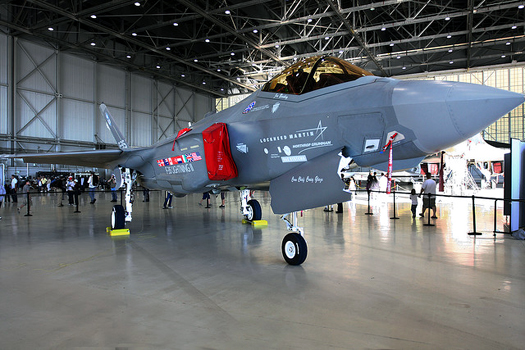Last June, I wrote an article for the Georgia Straight in B.C. about the skyrocketing costs of purchasing new F-35 Joint Strike Fighter jets from U.S. munitions giant Lockheed Martin.
At the time, the news had just broken that the price tag had jumped from $3.8 billion for 80 F-35s when the deal was first proposed back in 2008, up to $9 billion for just 65 jets, plus another $7 billion on “ancillary costs” such as future parts and maintenance. The total price tag had more than quadrupled within just two years! Now we understand from Pentagon figures that the total cost of this purchase over a 30-year period is expected to hit $29 billion, a staggering sum for a country with serious social and economic problems.
Just three years ago, the individual jets were priced at $47.4 million each. Now the price for each jet, plus parts and maintenance, has jumped over $400 million, at a time when the Harper Conservatives are slashing social program spending.
And it gets worse. The original plan by the Conservatives was to replace the Canadian Forces’ current fleet of CF-18 fighter jets. Since then, $2.6 billion has been spent to upgrade the CF-18s.
A Commons committee has investigated the purchase of the new fighters, including the price tag and whether Canada actually needs these weapons. Eyebrows were quickly raised over the news that there would be no other bids for the contract. Another controversy has focused on the fact that the F-35 Joint Strike Fighter is a single-engine aircraft, unsuitable to patrol the Canadian Arctic. (The CF-18s have two engines, which many pilots consider an important safety feature.)
But the NATO war against Libya has raised even more serious issues over this massive boondoggle. With its payload of heavy armament, the F-35s are useful for only one purpose: to engage in modern warfare, bombing “enemy” nations.
A year ago, a survey conducted by Leger Marketing asked “With Canada’s military role ending in Afghanistan next year, what should the focus be on the government’s military spending?” Almost 60 per cent agreed with this answer: “Canada should take a peace dividend and cut back on military spending to focus on other more pressing social issues at home.” Only 28 per cent of respondents wanted to “sustain or increase spending on the military because security in a post-9/11 world is of the highest priority”.
Yet according to the Canadian Centre for Policy Alternatives, “the Canada First Defence Strategy, unveiled by the Harper government in 2008, promises that Canada’s military spending will continue to grow by an average of 0.6% in real terms (adjusted for inflation) and an average of 2.7% in nominal terms (not adjusted for inflation) per year from FY 2007-08 to 2027-28.”
Total spending over the 20-year life of this plan would likely be in the $415-440 billion range (2009 dollars), or about $13,000 per Canadian, surely enough to cause us to rethink the quaint notion that this country’s military spending is negligible.
Imagine what could be done with the $29 billion in savings by scrapping the F-35 deal! To give just a few examples, the public transportation systems of Canadian cities could be provided with 10,000 fuel-efficient new buses for just $5 billion.
We could restore the start-up cost of the cancelled national child-care program, for another $5 billion. To build 30,000 social housing units, at a cost of $200,000 each, would take another $6 billion — an investment which would immediately save millions spent by provinces and municipalities on emergency services for homeless people.
The federal government could provide free post-secondary tuition for 50,000 students annually, for a total of about $8 billion over three decades. That would still leave another $5 billion for urgent needs such as providing clean drinking water to indigenous communities, or emergency aid to countries hit by natural disasters. These initiatives would create jobs, lower greenhouse gas emissions, and reduce provincial government spending.
But Canada is governed today by a party which opposes these urgent priorities. The Harper Conservatives deny the environmental crisis, reject the concept of public childcare, and refuse to fund social housing.
In effect, Canada is ruled by a minority regime which places top priority on war making at the expense of the people. When we go to the polls on May 2, Canadians should send the message to all parties in Parliament that the shocking fighter jet purchase plan is a scandal and must be scrapped immediately.
Kimball Cariou is the recording secretary for StopWar.ca, Vancouver’s antiwar coalition.



